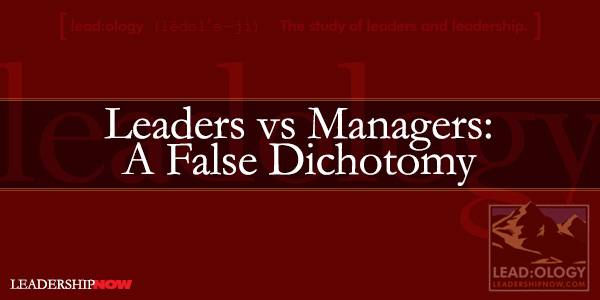 |
 |
06.22.09

lead:ology - Leaders vs Managers: A False Dichotomy
The distinctions made by Bennis are important as they expose two very different and equally valuable mindsets. As each works best in the presence of the other, it is to our advantage that we possess and practice both. As the Teacher so wisely expressed in Ecclesiastes, “There is a time for everything.” It is through a developed sense of awareness and experience that we are able to determine which mindset we need to employ, relative to what and when. We are inclined by our own nature and encouraged by our educational system to favor management. We are content reproducing what we already know—or think we know. We have learned from the neurosciences that the mind is wired for efficiency and is most comfortable reproducing a limited range of responses to help us to better manage and make sense of our world. Management would seem to be our biological default as we tend toward the status quo—to equilibrium—and often for very life-sustaining reasons. But we need leadership to move us out of our comfort zone and grow to new possibilities. It is in the tension between the two—management and leadership—that we can be effective and relevant. Different roles, different results. Thus, both of these roles are needed not only on a personal level but also on a larger organizational level if we are to function efficiently and grow. Management is based on the response to the questions we had yesterday. Today, some of those responses are still valid, many are not. Leadership is needed to address the questions of today and bring us to a different place. This is especially true in times of great change. As noted in Presence: “Our actions are most likely to revert to what is habitual when we are in a state of fear or anxiety…. Even as conditions in the world change dramatically, most businesses, governments, schools, and other large organizations, driven by fear, continue to take the same kinds of institutional actions that they always have…. At best, we get better at what we have always done. We remain secure in the concern of our own worldview, isolated from the larger world.” Debates about which role is better, misses the point. The list isn’t about labels. It’s about different roles that produce different results. By creating a leader-manager distinction, by pulling them apart, we get a better sense of how they fit together. John Kotter makes this clear in What Leaders Really Do: The point here is not that leadership is good and management is bad. They are simply different and serve different purposes. The fundamental purpose of management is to keep the current system functioning. The fundamental purpose of leadership is to produce useful change, especially non-incremental change. It is possible to have too much or too little of either. Strong leadership with no management risks chaos; the organization might walk right off a cliff. Strong management with no leadership tends to entrench an organization in deadly bureaucracy. Management gives leadership a foundation to work from. Leadership keeps us growing and relevant. If a leader can not manage what they have created, then their leadership is not effective and serves no end. I asked Warren Bennis about his thoughts concerning the Leader-Manager distinction twenty years after they were first put into print: Unfortunately and unintentionally, my '89 book, On Becoming a Leader doesn't emphasize the role of and the need for effective managers. I thought then and still think that the distinction is a valid one. At the time I wrote about the differences, I believed that most organizations were under-led and over-managed. I still believe that's true of many of today's organizations. So while I still believe that distinction is still important, what I should have made much, much clearer is that both are important and sometimes those qualities are embodied in many exemplary leaders and, to repeat myself, both are important. If I had made that clearer and added that it's ridiculous to get polarized on the horns of a false dichotomy, I think a lot of folks would have welcomed that distinction. The best leaders I know are both leaders and managers. Warren Bennis’ list of distinctions helps us to understand that as leaders, we can get so busy serving the system that we actually create barriers to leadership. We can easily fall into the trap of leading only to manage what we have created. Leadership is about continually asking the right, challenging questions. It is about renewal. Curiously, we manage better when we chose to lead.
Posted by Michael McKinney at 09:56 AM
|
BUILD YOUR KNOWLEDGE
 

How to Do Your Start-Up Right STRAIGHT TALK FOR START-UPS 
Grow Your Leadership Skills NEW AND UPCOMING LEADERSHIP BOOKS 
Leadership Minute BITE-SIZE CONCEPTS YOU CAN CHEW ON 
Classic Leadership Books BOOKS TO READ BEFORE YOU LEAD |